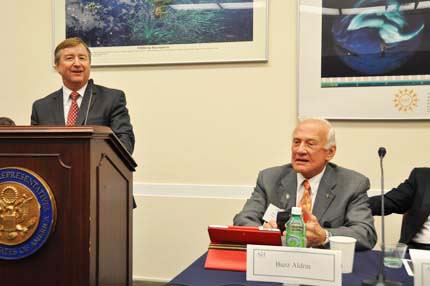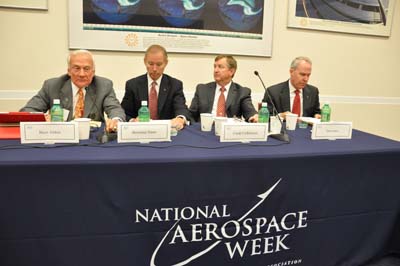Inspiration
Former space shuttle commander Frank Culbertson stepped up to the podium inside a hearing room in the Rayburn House office building yesterday morning, and talked about inspiration. He turned to his left and thanked moon walker Buzz Aldrin for a kind gesture last year during a visit to the Johnson S…
Former space shuttle commander Frank Culbertson stepped up to the podium inside a hearing room in the Rayburn House office building yesterday morning, and talked about inspiration. He turned to his left and thanked moon walker Buzz Aldrin for a kind gesture last year during a visit to the Johnson Space Center. "Buzz, my daughters were so grateful to get your autograph when we were down at the Cape. They said, 'Hey dad, there's the guy from Dancing With the Stars!' "

Now responsible for human spaceflight at Orbital Sciences Corporation, Culbertson repeated a familiar refrain from the nation's aerospace sector: "We need to make sure as a country to inspire people in this field."
He regarded the room full of congressional staffers, aerospace executives, and journalists invited by the Aerospace Industries Association, and lamented how today politics gets in the way of pursuing a vigorous human spaceflight program. He recalled coming to Capitol Hill in 1997 to defend NASA's decision to send astronaut David Wolf up to the Russian Mir space station in the wake of a fire onboard. "As I went through that process, I saw some sausage-making that I had not seen in the past. I wondered, do we as a country have the political will to go beyond Earth orbit? The political will needs to be developed along with the technical and safety procedures. Sometimes those fly in the face of politics."
To Culbertson's left, at the table with Aldrin, sat Brewster Shaw, a three-time shuttle pilot-astronaut (twice commander), and Tom Jones, a four-time shuttle mission specialist and Air Force B-52 commander. Each had a different take on the current state of U.S. space policy.

Shaw, who works in space exploration systems for Boeing, lamented the retirement of the space shuttle, calling it an overreaction of the Columbia Accident Investigation Board. "We relegated the program to premature termination," he said. Spaceflight is a risky endeavor, he said, noting that, whereas about one in every 25 people who've gone to space has died as a result, about one in 10 has died trying to climb the world's tallest mountain. "We humans choose to do things that are significantly more dangerous than flying to space."
Jones recalled preparing for his final mission, STS-98, which flew in February 2001. He asked a seasoned NASA manager when he thought astronauts would once again leave low Earth orbit. The manager thought, perhaps in 2012. "I was appalled. 2012?" said Jones, letting the irony sink in that we won't make that date either, by a long shot. "So what is all this for?" he asked. "I think that's a perspective I've carried the last 10 years. What's all this for? What's the payoff?"
Jones holds a special interest in asteroids, which he sees as a source of minerals and scientific study, and a way to open up a commercial frontier. "In our long-term strategy, we need to think about expanding our business resources. We need to bootstrap our way into space by tapping those resources. I think government's job is to prove this. The tax base you create is led by the government, and then let the commercial sector take over."
Aldrin articulated his support for keeping a deep space taxi in orbit around Earth, a reusable vehicle for extended-duration trips to near-Earth asteroids and Mars. But his larger point was shared by the other three: That the United States must have a long-term human spaceflight plan that lasts decades and continues pushing outward, no matter what.
After recounting the various inspirations he had along the way toward becoming an astronaut, Jones also pointed to the more urgent kind of inspiration offered by Earthbound asteroids, noting the two last week that passed by, inside the orbit of the moon. "What was the Dirty Harry line? Do you feel lucky today? It's just a matter of luck that we haven't been hit. The dinosaurs played by the rules 65 million years ago, and see where that got them? We need to change the rules."

Now responsible for human spaceflight at Orbital Sciences Corporation, Culbertson repeated a familiar refrain from the nation's aerospace sector: "We need to make sure as a country to inspire people in this field."
He regarded the room full of congressional staffers, aerospace executives, and journalists invited by the Aerospace Industries Association, and lamented how today politics gets in the way of pursuing a vigorous human spaceflight program. He recalled coming to Capitol Hill in 1997 to defend NASA's decision to send astronaut David Wolf up to the Russian Mir space station in the wake of a fire onboard. "As I went through that process, I saw some sausage-making that I had not seen in the past. I wondered, do we as a country have the political will to go beyond Earth orbit? The political will needs to be developed along with the technical and safety procedures. Sometimes those fly in the face of politics."
To Culbertson's left, at the table with Aldrin, sat Brewster Shaw, a three-time shuttle pilot-astronaut (twice commander), and Tom Jones, a four-time shuttle mission specialist and Air Force B-52 commander. Each had a different take on the current state of U.S. space policy.

Shaw, who works in space exploration systems for Boeing, lamented the retirement of the space shuttle, calling it an overreaction of the Columbia Accident Investigation Board. "We relegated the program to premature termination," he said. Spaceflight is a risky endeavor, he said, noting that, whereas about one in every 25 people who've gone to space has died as a result, about one in 10 has died trying to climb the world's tallest mountain. "We humans choose to do things that are significantly more dangerous than flying to space."
Jones recalled preparing for his final mission, STS-98, which flew in February 2001. He asked a seasoned NASA manager when he thought astronauts would once again leave low Earth orbit. The manager thought, perhaps in 2012. "I was appalled. 2012?" said Jones, letting the irony sink in that we won't make that date either, by a long shot. "So what is all this for?" he asked. "I think that's a perspective I've carried the last 10 years. What's all this for? What's the payoff?"
Jones holds a special interest in asteroids, which he sees as a source of minerals and scientific study, and a way to open up a commercial frontier. "In our long-term strategy, we need to think about expanding our business resources. We need to bootstrap our way into space by tapping those resources. I think government's job is to prove this. The tax base you create is led by the government, and then let the commercial sector take over."
Aldrin articulated his support for keeping a deep space taxi in orbit around Earth, a reusable vehicle for extended-duration trips to near-Earth asteroids and Mars. But his larger point was shared by the other three: That the United States must have a long-term human spaceflight plan that lasts decades and continues pushing outward, no matter what.
After recounting the various inspirations he had along the way toward becoming an astronaut, Jones also pointed to the more urgent kind of inspiration offered by Earthbound asteroids, noting the two last week that passed by, inside the orbit of the moon. "What was the Dirty Harry line? Do you feel lucky today? It's just a matter of luck that we haven't been hit. The dinosaurs played by the rules 65 million years ago, and see where that got them? We need to change the rules."